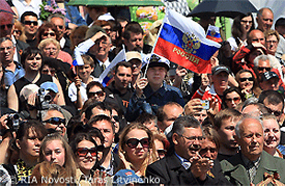Russia’s Main Problem isn’t Populism but Two Forms of Elitism, Emil Pain Says

(Paul Goble – Window on Eurasia – Staunton, May 5, 2019)
Russia’s main problem isn’t populism, Emil Pain says. Indeed, it does not really exist being instead just as much an imitation of political reality as Russian democracy is. Instead, “the real problem is Russia is elitism in its two basic forms,” the paternalist one in the state based on tradition and the “snobbish” version held many among the liberal intelligentsia.
The specialist on ethnic conflicts at the Higher School of Economics says it is critical to understand this reality if one is to avoid falling into despair or continuing approaches based on either that may make the problems Russia faces even more than they would otherwise be (liberal.ru/articles/7360).
The Russian state operates on the base of “paternalistic elitism,” a view that those in power should make the decisions and that those in the population should accept them. What is striking, Pain says, is that many liberals also are deeply suspicious of the ability of the people to rule. They want only to change the rulers, not the system of elite rule.
Many of the liberals are afraid that the state itself is under threat because of globalism, but an examination of the situation in the world shows the vitality of the state rather than its fragility. There are few indications that it or the international order are collapsing, despite the criticism both have received.
But what is more important, the Russian scholar says, is the failure of many to recognize that what is going on is not something new but rather something that has been embedded in liberal democracy since its founding and that has always been a threat to its survival unless other conditions are met.
“Liberal democracy,” Pain continues, “is an extremely fragile historical phenomenon, based on the combination of material of two different and to a large extent contradictory traditions: the liberal tradition of John Locke, oriented toward individual freedom, and the democratic tradition of Jean-Jacques Rousseau which emerged from the idea of the supremacy of collective popular sovereignty and civic equality.”
Those two things have always been at odds; and more than 70 years ago, Joseph Schumpeter suggested that they could come apart and threaten the whole: “With the development of mass democracy,” he wrote in Capitalism, Socialism and Democracy, “popular sovereignty in the form the classic model of democracy understood ceases to correspond to the demands of the times.”
What is needed to keep them together, Pain argues, is “a third connecting link, the civic nation.” Without that, without “a society which controls the state for the achievement of social and national interests,” the two will almost inevitably pull apart. And it is that which is now under threat.
“By the end of the 20th century, the idea of the combination of liberalism and democracy on the basis of recognition of popular sovereignty was supported both by liberal social scholars and the majority of leftist intellectuals from among the post-Marxists,” the Moscow sociologist says.
But despite that, “the threat of a breakdown in the links between these two blocks of values constantly remained. Under conditions of globalism, this threat grew still more and to a large degree conditioned the current crisis of liberal democracy.”
“The growth of cultural diversity increased the cultural heterogeneity of nation states, the distance between rulers and ruled, and between elites and masses did as well.” And the current wave of what people call populism is a protest against this, “not so much a protest against progress” as many imagine as a form of “anti-elitism.”
And that makes the problem of identity central at the present time. Many ordinary people feel excluded from the state, fear that the state is being used to protect minorities but not them, the majority, and feel that the state and the majorities must be defended especially in the wake of September 11.
As Pain observes, “one extreme position is giving rise to others, and inattention to the place of the ethnic majority in identity politics has become one of the causes of the unprecedented growth of national-populist movements speaking in the name of this majority,” a pattern many analysts have been slow to recognize.
Instead, Pain continues, all too many who view themselves as defenders of liberal democracy have instead become defenders of a “snobbish elitism” which casts doubt on the ability of the people to participate in politics and thus makes liberal democracy as embodied by them an object of attack by the people.
But populism is not nearly the threat to the state that many such people have imagined. It has been contained even where it appeared to win out because of the values of the community at large, and many of the triggers behind it, including the migration crisis, have eased over the last several years.
And while populism carries with it the risk of the rise of authoritarian leaders, it also can serve to revive democracy by restoring the balance between liberalism and democracy that in some places has tilted too far in the opposite direction, the Russian scholar suggests, making the current situation an opportunity rather than a mortal threat.
[Article also appeared at http://windowoneurasia2.blogspot.com/2019/05/russias-main-problem-isnt-populism-but.html]
[featured image is file photo, not directly related to article subject matter]
